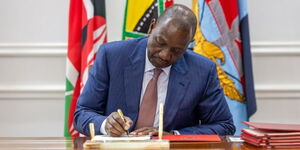Kenyans have expressed their displeasure in the constant rise of food prices as well as the cost of other commodities across the country.
Through a Twitter hashtag that has trended at the top since Sunday, February 20, Kenyans are angry that prices of basic commodities such as milk and bread have been on an upward spiral.
Since the pandemic hit the country in March 2020, the economy suffered immensely cutting across all sectors from Tourism to Manufacturing. Kenyans lost their sources of income. Business were wiped out as employers laid off staff to cut wage bill as they grappled with the cost of doing business.
For instance, in 2020 the price of bread stood at Ksh 50 which has, in a span of two years, increased to Ksh60 for select brands representing a 20 per cent increase.
Milk, on the other hand, retailed for Ksh50 in 2020, which increased to Ksh60 for a packet of 500mls while a kilogram of beef, which went for Ksh437 averagely, is now Ksh550.
Other products that recorded a significant rise in pricing are sugar (from Ksh114 per 1kg bag to over Ksh150 for some brands) and Maize flour (from Ksh90 to Ksh120 for a 2kg packet) and Cooking oil, which rose from Ksh220 per litre to crossing Ksh300 mark.
Wheat flour, which is the main reason for the increase in bread prices across the country, also recorded an increase in pricing from Ksh25,300 to Ksh33,000.
Non-food products that also saw a sharp spike include Petrol which used to retail at less than Ksh100 pre-pandemic but has since risen to Ksh129.
Diesel, on the other hand, rose from Ksh94 to Ksh111 per litre while Kerosene rose from Ksh85 to Ksh104 per litre.
The cost of refilling Liquefied petroleum gas (LPG) has also been a thorny issue in many homes with prices of the 6kg cylinder rising from under Ksh1,000 to nearly Ksh1,200 while the 13kg gas rose from Ksh2,000 to Ksh 2,850.
"If prices of food keep rising constantly and you must worry constantly about how to feed yourself, your children, your dogs, your cats and your chicken, your government has failed you," stated John Njenga.
"I am ready to mobilize for every Kenyan to match to Parliament and demand for tax reforms so that we can be able to Lower Food Prices We need to have the right conversation in the right context," lamented another.
Amani National Congress (ANC) leader Musalia Mudavadi, however, blamed the rise of the commodities to the handshake between former Prime Minister Raila Odinga and President Uhuru Kenyatta.
He claimed that the national debt had hit unprecedented levels since the two joined forces, increasing from Ksh4.5 trillion to 11.7 trillion.
“It may be of interest to note that debt commitment pre-handshake was Ksh4.5 trillion and the post-handshake figure has ballooned to Ksh11.7 trillion.
"Was the handshake a license to burdening Kenyans with punitive public debt, punitive taxation, punitive food prices and a high cost of living?" He questioned.
According to data released by the Kenya National Bureau of Statistics (KNBS) on January 31, the overall year on year inflation rate as measured by the Consumer Price Index (CPI) was 5.39 per cent, in January 2022.
That was mainly due to an increase in prices of commodities under food (8.89 per cent) and transport (6.84 per cent) among others.











